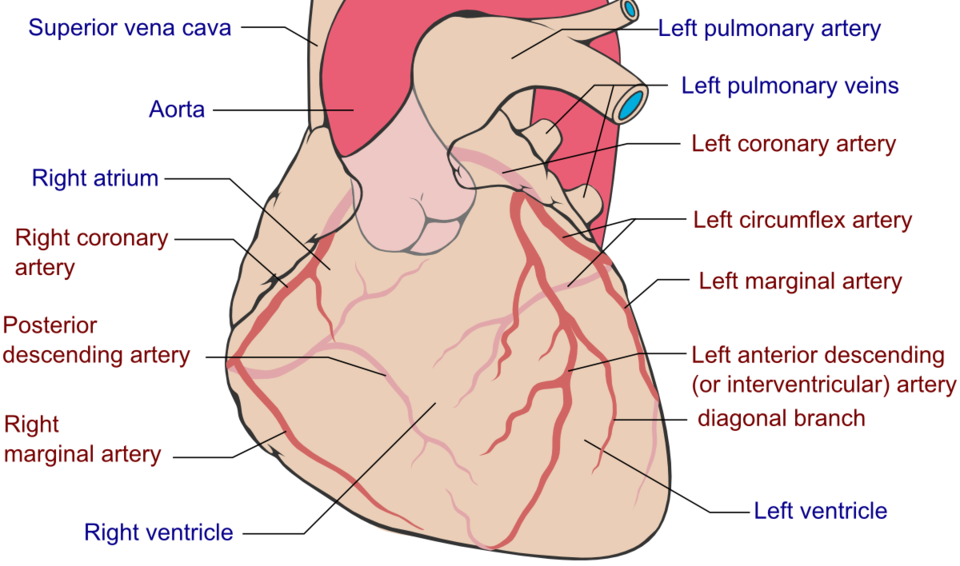Cardiology > Postpericardiotomy Syndrome
Postpericardiotomy Syndrome
Empty
1. Knuuti J, Wijns W, Saraste A, Capodanno D, Barbato E, Funck-Brentano C, et al. 2019 ESC Guidelines for the diagnosis and management of chronic coronary syndromes. Eur Heart J. 2020;41(3):407-477.
PMID: 31504439
DOI: https://doi.org/10.1093/eurheartj/ehz425
2. Fihn SD, Gardin JM, Abrams J, Berra K, Blankenship JC, Dallas AP, et al. 2012 ACCF/AHA/ACP/AATS/PCNA/SCAI/STS guideline for the diagnosis and management of patients with stable ischemic heart disease. J Am Coll Cardiol. 2012;60(24):e44-e164.
PMID: 23182125
DOI: https://doi.org/10.1016/j.jacc.2012.07.013
3. Khan MA, Hashim MJ, Mustafa H, Baniyas MY, Al Suwaidi SKBM, AlKatheeri R, et al. Global epidemiology of ischemic heart disease: Results from the Global Burden of Disease Study. Cureus. 2020;12(7):e9349.
PMID: 32742886
DOI: 10.7759/cureus.9349
4. Ibanez B, James S, Agewall S, Antunes MJ, Bucciarelli-Ducci C, Bueno H, et al. 2017 ESC Guidelines for the management of acute myocardial infarction in patients presenting with ST-segment elevation. Eur Heart J. 2018;39(2):119-177.
PMID: 28886621
DOI: https://doi.org/10.1093/eurheartj/ehx393
5. Amsterdam EA, Wenger NK, Brindis RG, Casey DE Jr, Ganiats TG, Holmes DR Jr, et al. 2014 AHA/ACC guideline for the management of patients with non–ST-elevation acute coronary syndromes. J Am Coll Cardiol. 2014;64(24):e139-e228.
PMID: 25260716
DOI: https://doi.org/10.1016/j.jacc.2014.09.017
Background
Postpericardiotomy Syndrome (PPS) is a delayed autoimmune inflammatory response that occurs days to weeks following cardiac surgery involving incision or manipulation of the pericardium. It is characterized by pericardial and/or pleural inflammation, presenting with fever, pleuritic chest pain, pericardial or pleural effusion, and elevated inflammatory markers.
II) Classification/Types
By Onset:
- Acute PPS: Occurs within the first week postoperatively.
- Subacute PPS: Most commonly develops 1–6 weeks after surgery.
- Chronic/Recurrent PPS: Persistent or relapsing symptoms for months.
By Clinical Features:
- Pericardial-dominant: Chest pain, friction rub, pericardial effusion.
- Pleural-dominant: Dyspnea, pleural effusion, pleuritic pain.
- Mixed presentation: Both pericardial and pleural involvement.
III) Pathophysiology
PPS is believed to result from an autoimmune process triggered by surgical trauma to pericardial and pleural tissues. The exposure of intracellular antigens leads to the formation of autoantibodies and activation of inflammatory cascades, causing pericarditis, pleuritis, and effusions. Elevated interleukins and complement levels support an immune-mediated etiology.
IV) Epidemiology
- Incidence: Affects up to 10–40% of patients after open-heart surgery.
- Age: More common in children but occurs in all age groups.
- Timing: Typically presents 1–6 weeks postoperatively.
- Risk Factors: Younger age, prior PPS episodes, extensive pericardial dissection, and use of cardiopulmonary bypass.
Etiology
I) Causes
- Incision or manipulation of the pericardium during:
- Coronary artery bypass grafting (CABG)
- Valve replacement or repair
- Aortic root surgery
- Direct trauma to pleura or myocardium
II) Risk Factors
- Younger age (especially pediatric patients)
- Extensive pericardial manipulation
- Use of cardiopulmonary bypass
- History of autoimmune disease
- Early post-op withdrawal of anti-inflammatory prophylaxis
Clinical Presentation
I) History (Symptoms)
- Fever (low-grade or spiking)
- Pleuritic chest pain
- Dyspnea or orthopnea
- Fatigue
- Nonproductive cough
- Pericardial discomfort relieved by sitting up
II) Physical Exam (Signs)
Vital Signs:
- Low-grade fever
- Tachycardia (from effusion or systemic inflammation)
Cardiac:
- Pericardial friction rub
- Muffled heart sounds if large effusion or tamponade
Pulmonary:
- Dullness to percussion and decreased breath sounds (pleural effusion)
Peripheral:
- Jugular venous distension (if tamponade)
- Peripheral edema (if associated with heart failure)
Differential Diagnosis (DDx)
- Acute post-op pericarditis (non-immune mediated)
- Infectious pericarditis
- Pulmonary embolism
- Pneumonia
- Post-op fever from infection (e.g., mediastinitis)
- Dressler syndrome (post-MI pericarditis)
Diagnostic Tests
Initial Tests:
Electrocardiogram (ECG):
- Diffuse ST elevation and PR depression (pericarditis pattern)
- Sinus tachycardia
Chest X-ray:
- Cardiomegaly (pericardial effusion)
- Pleural effusion
Echocardiogram (TTE):
- Pericardial effusion (assess size and hemodynamic impact)
- Tamponade physiology
Laboratory Tests:
- Elevated ESR and CRP
- Leukocytosis
- Mildly elevated troponin (if epicardial inflammation)
Pleural Fluid Analysis (if tapped):
- Exudative, sterile effusion
- Elevated protein and LDH, lymphocytic predominance
Pericardial Fluid (if pericardiocentesis needed):
- Typically sterile
- Elevated WBC count, protein, LDH
Treatment
I) Medical Management
Anti-inflammatory Therapy:
- NSAIDs (e.g., ibuprofen or aspirin): First-line treatment
- Colchicine: Reduces recurrence and duration
- Corticosteroids: Reserved for refractory cases or contraindications to NSAIDs/colchicine
Supportive Care:
- Antipyretics and hydration
- Oxygen if hypoxic from pleural effusion
- Diuretics if significant volume overload
Pericardial Drainage:
- Indicated if tamponade or large, symptomatic effusion
Pleural Drainage:
- Therapeutic thoracentesis for large or symptomatic effusions
II) Surgical/Interventional
- Pericardial window: For recurrent or loculated pericardial effusions
- Pericardiectomy: Rare, for recurrent constrictive PPS
Patient Education, Screening, Vaccines
Education:
- Explain the autoimmune nature and expected self-limited course
- Emphasize adherence to anti-inflammatory regimen
- Teach signs of tamponade (e.g., syncope, hypotension, JVD)
Lifestyle:
- Rest during acute phase
- Gradual return to activity post-resolution
Vaccinations:
- Annual influenza and COVID-19 vaccines to reduce secondary infection risk
Consults/Referrals
- Cardiology: All moderate to severe cases or recurrent effusion
- Cardiothoracic Surgery: For persistent/recurrent tamponade or window procedure
- Infectious Disease: If concurrent infection suspected
- Pulmonology: For evaluation of recurrent pleural effusion
Follow-Up
- Reassess symptoms and inflammatory markers (CRP/ESR) weekly
- Serial echocardiograms if effusion noted or symptoms persist
- Monitor for constrictive pericarditis (rare but serious long-term complication)
- Consider tapering colchicine or steroids only after full symptom and biomarker resolution
Recommended
- Myocarditis
- Dilated cardiomyopathy
- Hypertrophic Cardiomyopathy
- Restrictive cardiomyopathy
- Alcoholic Cardiomyopathy
- Peripartum (Postpartum) Cardiomyopathy (PPCM)
- Takotsubo (Stress) Cardiomyopathy (Broken Heart Syndrome)
- Cardiac cirrhosis (congestive hepatopathy)
- Cocaine-Related Cardiomyopathy
- Endomyocardial Fibrosis
- Cardiac amyloidosis
- Myopathies
- Postpericardiotomy Syndrome

Stay on top of medicine. Get connected. Crush the boards.
HMD is a beacon of medical education, committed to forging a global network of physicians, medical students, and allied healthcare professionals.
